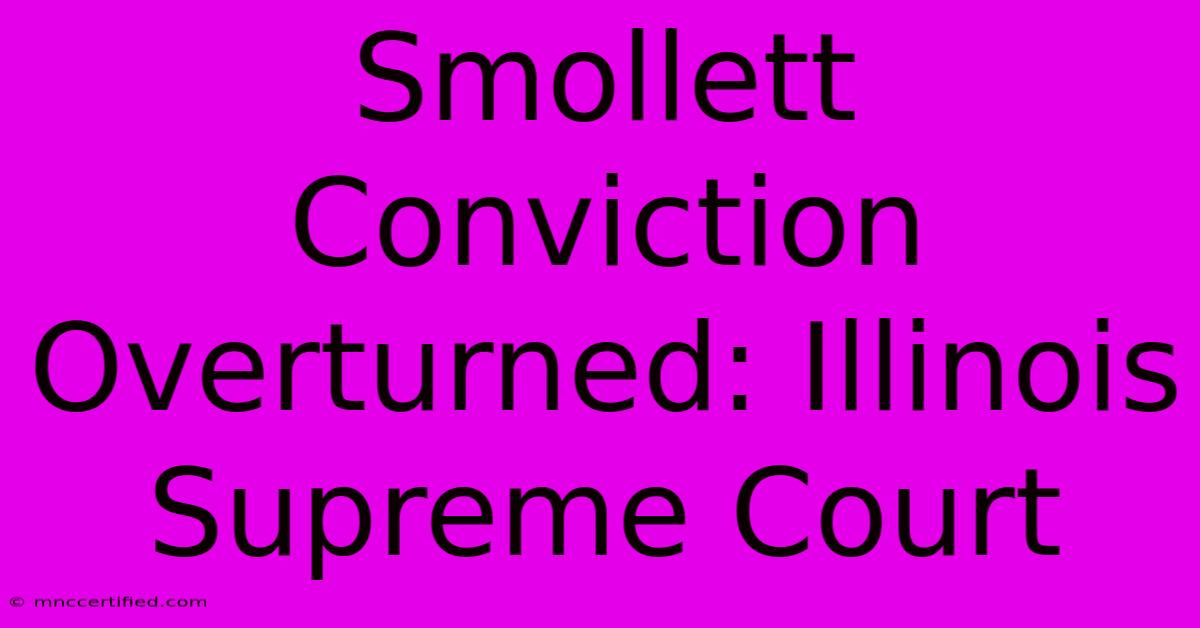Smollett Conviction Overturned: Illinois Supreme Court

Table of Contents
Smollett Conviction Overturned: Illinois Supreme Court Delivers Stunning Reversal
The Illinois Supreme Court delivered a shockwave through the legal world on March 9, 2024, when it overturned the conviction of Jussie Smollett on charges of disorderly conduct. This decision, stemming from the controversial 2019 alleged hate crime hoax, has reignited intense debate and raised significant questions about the integrity of the prosecution. This article delves into the key aspects of the Supreme Court's ruling, analyzing its implications and examining the broader context of the case.
Understanding the Original Case: A Recap
Before examining the Supreme Court's decision, it's crucial to recall the original accusations against Smollett. The actor claimed he was the victim of a racist and homophobic attack in Chicago, involving two masked men shouting racial and homophobic slurs and placing a noose around his neck. However, subsequent investigations revealed that Smollett allegedly orchestrated the entire event, paying two brothers to stage the attack. He was subsequently charged with disorderly conduct – a felony – for filing a false police report.
Smollett's conviction in 2021 sent shockwaves through the media. The case became a highly publicized example of alleged false accusations and the complexities of investigating hate crimes. The initial trial and subsequent sentencing were widely covered, sparking extensive public discussion about racial justice, media accountability, and the potential for manipulation within the legal system.
The Illinois Supreme Court's Decision: A Key Procedural Issue
The Illinois Supreme Court's decision to overturn Smollett's conviction did not center on the merits of the underlying accusations. Instead, the court focused on a critical procedural issue: the dismissal of some of the special prosecutor's charges. The court ruled that the trial judge improperly dismissed certain counts, and that this prejudiced Smollett's rights. This procedural error was deemed serious enough to warrant a reversal of the conviction, even though the court acknowledged the strength of evidence against him.
This highlights the importance of strict adherence to legal procedure in criminal cases. Even in cases where overwhelming evidence points to a defendant's guilt, procedural errors can have significant and potentially unforeseen consequences. The decision underscores the principle of due process, emphasizing the need for fairness and impartiality within the justice system. The court's focus on procedural errors, rather than substantive questions of guilt or innocence, has become a major point of discussion amongst legal scholars.
The Significance of the Ruling
The overturning of Smollett's conviction has far-reaching implications. It raises questions about:
- The role of special prosecutors: The case highlights the complexities and potential pitfalls involved in appointing special prosecutors.
- The impact on future hate crime investigations: The Smollett case, regardless of its outcome, will undoubtedly impact future investigations into alleged hate crimes, potentially leading to increased scrutiny and a more cautious approach.
- Public perception of the justice system: The reversal of the conviction reinforces skepticism regarding fairness and consistency within the justice system, particularly in highly publicized cases.
The ruling serves as a potent reminder of the delicate balance between ensuring justice and upholding due process.
The Aftermath and Ongoing Debate
The Illinois Supreme Court's decision has sparked intense debate and analysis. While some hail the ruling as a victory for procedural justice, others criticize it as a setback for justice itself, given the evidence presented against Smollett. The lack of a retrial reinforces the lasting ambiguities surrounding the case. The core question remains: Was justice served? The answer, unfortunately, continues to be debated and interpreted differently across legal and public discourse.
The case of Jussie Smollett and its reversal by the Illinois Supreme Court remains a complex and multifaceted legal saga, providing valuable fodder for ongoing discussions regarding procedural law, due process, and the delicate balance between achieving justice and maintaining the integrity of legal proceedings. Further analysis and commentary on the ruling will undoubtedly continue to shape legal and public opinion for years to come.

Thank you for visiting our website wich cover about Smollett Conviction Overturned: Illinois Supreme Court. We hope the information provided has been useful to you. Feel free to contact us if you have any questions or need further assistance. See you next time and dont miss to bookmark.
Featured Posts
-
Iceland Volcano Seventh Eruption This Year
Nov 22, 2024
-
Watch Arsenal Vs Juventus Womens Champions League
Nov 22, 2024
-
Pratt On Bengals Steelers A Win
Nov 22, 2024
-
Utah Life Insurance License Cost
Nov 22, 2024
-
Commercial Insurance Remote Jobs
Nov 22, 2024